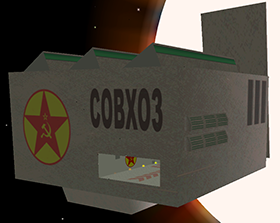Difference between revisions of "CZGF"
m |
m |
||
| Line 8: | Line 8: | ||
|defenders = 30 | |defenders = 30 | ||
|isoxp = OXP | |isoxp = OXP | ||
| + | |beacon = F | ||
}} | }} | ||
==Origins== | ==Origins== | ||
Revision as of 09:01, 3 June 2010
| Collective Zero-Gravity Factory | |
|---|---|

| |
| Size (metres, W×H×L) | 1210 x 960(1335) x 1150(2110) |
| Manoeuvrability | Roll: 0.5 Pitch: 0.5 Speed: 0.0001 LM |
| Rotating | No |
| Energy recharge rate | 150 |
| Armaments | Shield Enhancer |
| Defenders | 30 |
| OXP or standard | OXP |
| Beacon | F |
Origins
In 3137 (Galactic Mean Time) GASEC unveiled their new design of space station, the Icosahedron or Ico station. Unbenownst to them, and indeed much of the Galaxy, almost a decade earlier, the Communist systems had been experimenting with station designs of their own in an attempt to utilise the power of their systems' stars. With the typical minimalist approach to design that defines most Communist equipment these early stations were reduced down to the most basic functions, air and water recycling, heating and power systems for the machines in the station. 'Luxury details' like artificial gravity and recreation facilities were ignored, since both would be a burden on the primative power converters these early stations utilised. Thus it was that even as the GASEC design team spend hundreds of millions of Credits designing and constructing the first Ico stations, the Communist systems were deploying and refining the functions of their own Collective Zero-Gravity Factories.
Development and Functionality
The primary purpose of the Zero-G Factories was to be an extension of planet-based heavy industries such as ore refining, metalworking, ship building and retro-designing already available technology for use in Communist-constructed ships. The original cost-saving lack of artificial gravity turned out to be a benefit as it allowed workers to manipulate large objects around the factory areas without the need for heavy-lifting exo-suits or cranes and productivity soared. However, the flaw in this design became apparent after the first workers returned from their six-month tour of duty on the factories. Living in a zero-gravity environment for such a long period of time had resulted in severe muscle and bone atrophy, leaving the workers almost invalided on their return to their homes. To counter this, Communist scientists immediately installed hi-gravity training arenas, making the factories 1335 metres taller. Within the hi-grav arenas, training equipment and sports arenas were installed and the overall gravity was set at 5% above normal gravity for the workers' home planet and workers were allowed a standard period of recreation time. With this, workers could be encouraged to work harder for the reward of longer recreation periods.
It was the disaster at the Chernobol station that turned the scientists to the long-overlooked issue of safety. With rudimentary power converters, the Zero-Gravity Factories could operate at high rates of production, but no thought was put into what might happen if the power converters should malfunction and experience an overload. An overload is exactly what happened at the Chernobol station, the under-maintained converters had been put under extreme duress, trying to keep up with the ever-increasing demand for power by the many processes the factory was using. Over time they began experiencing fluctuations in their output, but these were overlooked as unimportant anomalies. It wasn't until the power converters went into terminal meltdown that the dangers were seen. Within hours, the overworked converters began to give off lethal ionising radiation, burning through the almost non-existant shielding to irradiate the entire station. Thousands of workers died, either immediately from direct incineration by the super-heated gases that rushed through the corridors of the station or, later from terminal carcinomas caused by exposure to the radiation. Immediately following this incident, all Zero-Gravity Factories had their power converters overhauled and installed metres-thick shielding around them. Additionally, an emergency ejection system was put in place which consisted of a simple gun barrel-like ejector, 960 metres long, directly above the convertors. In the event that any of the power converters begin to show the first signs of fluctuations, the monitoring station can quickly fire the overloading converter away from the station. Thereupon a new power converter is built by the workers to take the strain off the remaining converters.
The Present
Now, the Collective Zero-Gravity Factories produce a wide range of crude but effective equipment for ships using the standard 'plug and fly' installation modules at bargain prices, much to the annoyance and complaints of their corporate competitors. A Commander docking at a CZGF may be surprised to find equipment on offer not normally available at systems with a similar Tech Level, along with heavy industry commodities at a reduced price.
Factories in systems with large, powerful suns have even been fitted with enhanced thermal shielding and heat dissipation modules to counter the dangerously high levels of thermal radiation they receive so that no matter what, productivity and Communism can continue unimpeded.
Download page
This ship is part of the Commies.oxp Expansion pack for Oolite. To get this expansion, click here.